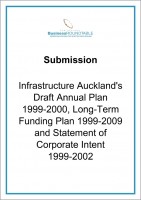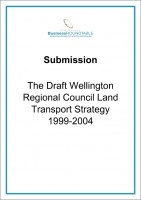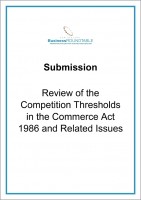
Age Discrimination and Employment Law
The topic of discrimination in the law of employment is one of the growth industries of our time. The issue covers the gamut from race, to sex, to disability and to age. Read more


The topic of discrimination in the law of employment is one of the growth industries of our time. The issue covers the gamut from race, to sex, to disability and to age. Read more

The Paper favours greater regulation of takeovers and insider trading and greater coordination, if not amalgamations, of regulatory institutions and regimes. It asks for comments on these proposals and provides 11 specific questions to guide respondents. Read more

The NZBR has taken a close interest in Commerce Act issues because of the pervasive influence of the Act on commercial decision making in New Zealand. Read more

Norman Barry defends the morality of Anglo-American business, a form of which is practised in New Zealand, against critics who argue that market morality has to be imposed from outside. He claims that proposals to impose wider forms of ‘social responsibility’ on firms would be bad for business and, therefore, for society. Read more

The case for stadium and event subsidies is a weak one. The economic arguments in favour of such subsidies do not succeed. Read more

It is vital that Infrastructure Auckland establishes a valid and consistent view of its role and function that conforms fully with its governing legislation. We consider that in the Plan Infrastructure Auckland has not adequately distinguished its responsibilities and activities from those of other agencies and it has given insufficient attention to its statutory obligation to fund public (not private) good activities. Read more

The Regional Land Transport Committee (the Committee) is responsible for preparing the Strategy. The Committee is chaired by a Wellington Regional Council (WRC) councillor and includes the representatives of 17 organisations. Read more

The subject of this paper is a failed venture in international economic cooperation, the Multilateral Agreement on Investment (MAI). I consider the reasons for the failure and its wider implications. Read more

Remember 1994? That was the year that marked a decade of economic reforms in New Zealand. Read more

We have supported moving to a single competition threshold test that would apply to trade practices and business acquisitions. Business acquisitions and trade practices are part of a continuum of possible contractual arrangements rather than distinctly different forms. They should therefore be subject to the same regulatory rules. Read more

The NZBR has taken a close interest in electricity sector reform issues over the past 15 years. We have strongly supported moves to put the industry on a more conventional commercial footing, subject to only light-handed regulation. Read more

The NZBR strongly supports the government's broad approach to road reform in recent years. We have done so because the road network is an important part of the nation's infrastructure and we believe that substantial efficiency gains can be achieved by reforming its management. Read more

In our view the Statement is seriously deficient. Its first major deficiency is its failure to point out that the proposed measures will not remedy the problems that motivate them, even if all countries achieve their targets. Read more

A chronic tendency in many areas of policy in the past in new Zealand was to respond to 'crises' or 'threats' by establishing national 'strategies' or 'plans'. Thus, in the 1970s, concerns about energy supplies led to 'energy plans' and ultimately to the Think Big programme. Read more

Over the past two decades, economic policies across the world, and economic systems with them, have changed their character, their complexion. To an extent that few anticipated before the event, a large and growing array of governments have adopted measures, and in some cases whole programmes, with the intention and the effect of making their economies freer, more open and less regulated: both individually and in concert, they have taken the path of economic reform. Read more